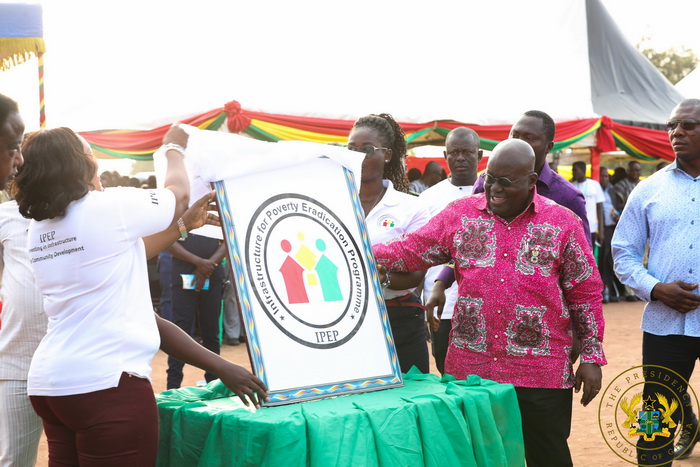
One-district, one-warehouse launched
President Nana Addo Dankwa Akufo-Addo last Wednesday rolled out the government’s one-district, one-warehouse programme with a sod-cutting for work to begin on the first warehouse project in Ejura in the Ashanti Region.
The warehouse project is a component of the government’s Infrastructure for Poverty Eradication Programme (IPEP).
Warehouses are to be constructed in the 216 districts to handle produce and store the anticipated surpluses under the government’s Planting for Food and Jobs initiative.
Post-harvest losses
Performing the sod-cutting, which was used to mark this year's World Food Day, President Akufo-Addo said the construction of the warehouses in all districts would not only minimise post-harvest losses but also improve the marketing of agricultural produce.
He said the warehouses would help address poor farm-level practices,handling and storage activities that exposed farm produce to moulds, rodents and other pests.
At the launch of the Planting for Food and Jobs programme in Sunyani in April this year, the President declared the intention of the government to construct 1,000 metric tonne-capacity warehouses in each of the 216 districts under its one- district, one-warehouse programme.
“Today, we commence the fulfilment of this pledge, a project to be supervised by the Minister for Special Development Initiatives, Mrs Mavis Hawa Koomson, Member of Parliament (MP).
“The construction of warehouses, under the Infrastructure for Poverty Eradication Programme (IPEP), will be a major booster in our efforts to guarantee food security and the transformation of the agricultural sector,” he said.
“The IPEP, another campaign promise of my party in the run-up to the December 2016 elections, is to provide each of the 275 constituencies with the cedi equivalent of US$1 million every year to tackle issues relating to infrastructural development and poverty eradication in rural and deprived communities,” he added

Commitment
President Akufo-Addo expressed the commitment of the government to accelerate the construction of the warehouses which would have modern equipment, including drying or freezing systems.
“These warehouses will also be certified to enable them to participate in the warehouse receipting system being implemented under the Ghana Commodities Exchange project.
“This system will promote the financial inclusion of our smallholder farmers. The farmers will be able to deposit their farm produce in these warehouses and use it to address their financial needs in various ways under the warehouse receipt system,” he added
The President said it was also envisaged that, with the successful implementation of the warehouse receipt system, many smallholder farmers would no longer have to sell their farm produce immediately after harvest, especially during periods when market prices were generally low.
It would further help address the challenges of price volatility, he said.
“The warehouses will also promote our non-traditional exports. Ghanaian farmers will now be able to store their farm produce in the most efficient and effective manner to enable them to export, create employment and earn foreign exchange,” he said.

Special Development Initiative
The Minister of Special Development Initiatives, Mrs Koomson, said the government intended to construct a warehouse in each district to serve as catalyst for agricultural development in the country.
She said the selection of Ejura to begin the project was in recognition of the municipality as the food basket of the country.
The Chief of Agona Akrofonso and the Ashanti Regional representative on the Council of State, Nana Owusu Achiaw Brempong, who chaired the ceremony, commended the government for the project and for its effort to modernise agriculture in the country.
